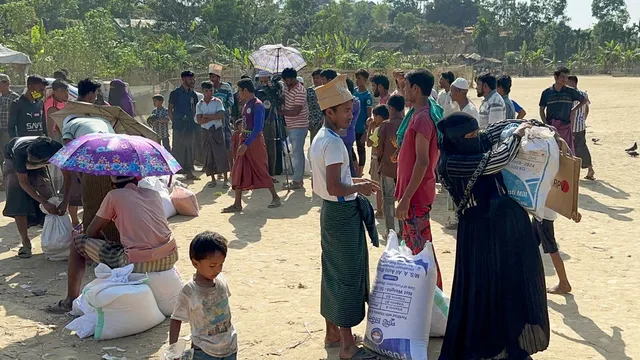
Malnutrition crisis escalates in Rohingya refugee camps due to aid cuts
2025-03-13 12:44- Malnutrition levels in Rohingya children have surged to over 15%, the highest since 2017.
- Upcoming food ration cuts by the World Food Program threaten to exacerbate the crisis further.
- Immediate international response is essential to support and prevent further deterioration of conditions.
Express your sentiment!
Insights
In Bangladesh, acute malnutrition among Rohingya children has reached alarming levels, with over 15 percent now malnourished— the highest rates since the 2017 influx of refugees following mass violence in Myanmar. This surge in malnutrition is attributed to drastic cuts in food assistance as the World Food Program (WFP) plans to reduce food rations due to significant funding shortfalls stemming from a broader global financial crisis. With nearly half a million children living in the world's largest refugee settlement, the situation is deteriorating as families face emergency levels of nutrition deprivation. The Rohingya community includes many women and children who have suffered the most from these recent aid reductions. Reports indicate that the cuts, which could halve individual rations from $12.50 to $6 in April 2025, will exacerbate the already poor dietary quality and health of children in the camps. A UNICEF representative highlighted the urgent need for increased funding and support, expressing fears for the well-being of Rohingya children if these cuts proceed. Amid these concerns, the humanitarian situation is further complicated by ongoing unrest in Myanmar, which has forced new families to seek refuge in the overcrowded camps in Cox's Bazar. Additionally, the rollbacks in support from the U.S., historically a major donor to aid efforts for Rohingya refugees, pose a significant challenge to the already strained resources. The previous administration's freeze on funding has created worry within the international aid community, as many organizations strive to address this crisis. With U.N. Secretary-General António Guterres visiting the camps soon, there are hopes that his presence will galvanize international action and ensure that aid reaches those in dire need. As the crisis evolves, the voices of aid workers and humanitarian organizations underscore the severe implications of continued funding cuts on the health and survival of the Rohingya population in Bangladesh. Officials warn of potential grave consequences, and without urgent intervention, the situation will likely worsen as thousands of real lives hang in the balance, dependent on humanitarian support.
Contexts
The history of United Nations assistance to Rohingya refugees is rooted in a complex interplay of humanitarian crises, geopolitical challenges, and international response mechanisms. The Rohingya, a Muslim ethnic minority from Myanmar, have faced systematic discrimination, violence, and persecution, leading to significant displacement. The UN's involvement began to escalate in the late 20th century, with the Rohingya fleeing to neighboring countries, particularly Bangladesh, where they sought refuge from violent crackdowns and military operations. The UN High Commissioner for Refugees (UNHCR) has been a leading agency in providing emergency assistance, protection, and advocacy for the Rohingya, emphasizing their rights under international law and urging member states to take action to address their plight. In recent decades, the situation deteriorated markedly, particularly during the violent outbreaks in 2016 and 2017, which saw hundreds of thousands of Rohingya fleeing to Bangladesh in an unprecedented exodus. The UN responded by launching emergency appeals, facilitating the influx of humanitarian aid, and coordinating responses among various agencies such as the World Food Programme (WFP) and UNICEF. This assistance included the provision of food, shelter, healthcare, and education for the Rohingya community in refugee camps like those in Cox's Bazar. The UN has continuously sought to raise awareness about their human rights abuses and to hold the Myanmar government accountable for its actions against the Rohingya population. UN assistance has also extended to advocating for long-term solutions for the Rohingya refugees. This involves not only addressing immediate humanitarian needs but also engaging in dialogues about repatriation, integration, and long-term resettlement. The UN has emphasized that any repatriation must be safe, voluntary, and dignified, advocating for the restoration of rights and citizenship for returning Rohingya refugees. Furthermore, the UN General Assembly has passed resolutions condemning the violence and calling for increases in humanitarian funding. Collaboration with neighboring countries, NGOs, and the international community has been crucial for sustaining the aid pipeline and addressing the ongoing crises. Despite these efforts, challenges remain pervasive. Political, logistical, and financial barriers pose significant hurdles to effective assistance. Funding shortages and donor fatigue have been chronic issues hampering the scale of the humanitarian response. The UN continues to call upon member states to fulfill their financial commitments to support Rohingya refugees and to engage in advocacy that fosters improved conditions both in the host countries and in Myanmar. The plight of the Rohingya remains a pressing human rights issue, with the UN's role pivotal in mobilizing international action and ensuring that the voices of the refugees are heard on the global stage.